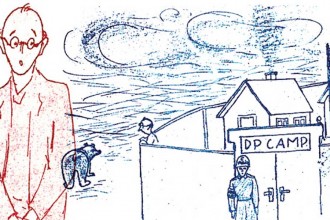He worked most of his career as an officer with the Secret Service, but many Swedes remember him today as the man who sold military secrets to the Soviet Union in the 1970’s.
In March 1979, news broke that a Swede had been arrested in Israel suspected of having sold military secrets to the Soviet Union. Months later, Stig Bergling, who was an officer with the Swedish Security Service Säpo at the time of his arrest, was convicted of aggravated espionage. And once the full story about how the former Säpo officer had sold out his country’s coastal defence to the Soviets got out, it shook the general public in Sweden, says journalist and author Jan Mosander who contributed to the case against Bergling in the 1970’s.
“The reactions were enormous. Partly because of the heavy damage he had caused by leaking this classified information, but partly also because there had been early warnings against Stig Bergling that had been neglected,” says Mosander.
Bergling started his career as a police officer in Stockholm in the late 1950’s, a decade later he had worked his way up to the Secret Service and for a short period of time he worked for the Defence Staff handling the country’s most top secret documents. It was during this time that he got access to the highly classified information about the country’s coastal defence sites that he would later sell to the Soviet Union’s intelligence service, the GRU.
But despite his high position at the Defence Staff, Bergling wasn’t happy with his job. He says in an interview with Swedish Television, SVT, that he didn’t get along with his boss and that would’ve rather worked out in the field with counter espionage.
Bergling says that he was taken aback by the lacking security at the office. They didn’t even keep track of how many copies you made, he says, adding that this eventually made him resent the place.
Knowing that no one could track the documents, he decided to photocopy a folder of classified information and save it for a rainy day. The rainy day came a few years later, in 1973, when Bergling was on a UN mission in Lebanon. He tells SVT that he was planning to go back to Stockholm with a girl he was seeing in Beirut, but that he needed cash.
So he got in touch with a Soviet officer in Beirut who had ties to the GRU and told him about the documents he had copied while working for the Defence Staff, and that was that, says Bergling.
“I thought that I would hand over the folder and be done with it, but he made me sign a receipt, and as anyone who’s read a good spy novel knows; once you’ve done one incriminating thing there is no escape,” Bergling says.
Over the years, Bergling leaked thousands of documents to the Soviets, but nothing as sensitive as the first folder.
In 1979, he was sentenced to life in prison, but less than a decade later he made the news again when he managed to abscond together with his wife during a conjugal visit in a Stockholm suburb. With police watching the entrance, Bergling simply walked out the back door.
“The Secret Service and the Prison Authorities were responsible for observing him, but they didn’t cooperate and that made it possible for Bergling and his wife to escape,” says Mosander.
His escape was a major embarrassment for Sweden’s prison system and the scandal led to the resignation of the justice minister.
After a few years in Russia, Hungary and Lebanon, Bergling returned to Sweden voluntarily in the 1990’s and served the last years of his sentence.
He passed away earlier this year at a nursing home in Stockholm, but before his death he did numerous interviews and even wrote a book trying to tell his side of the story, but despite his efforts Jan Mosander thinks that most people here today still remember him as the spy responsible for one of the biggest scandals in modern history.





